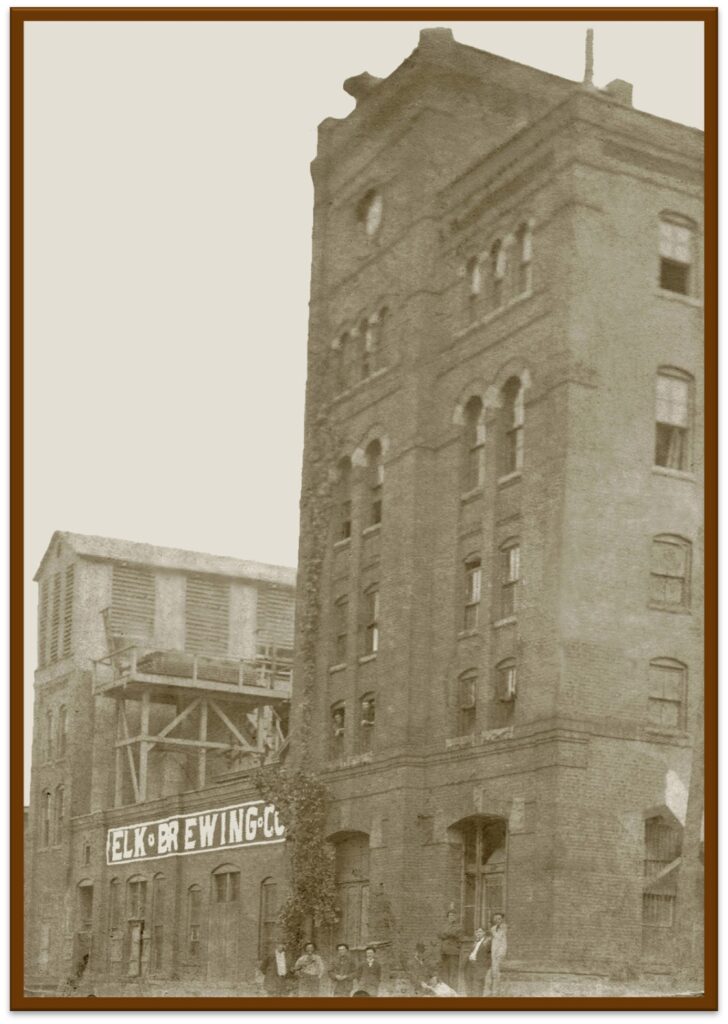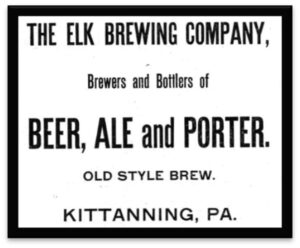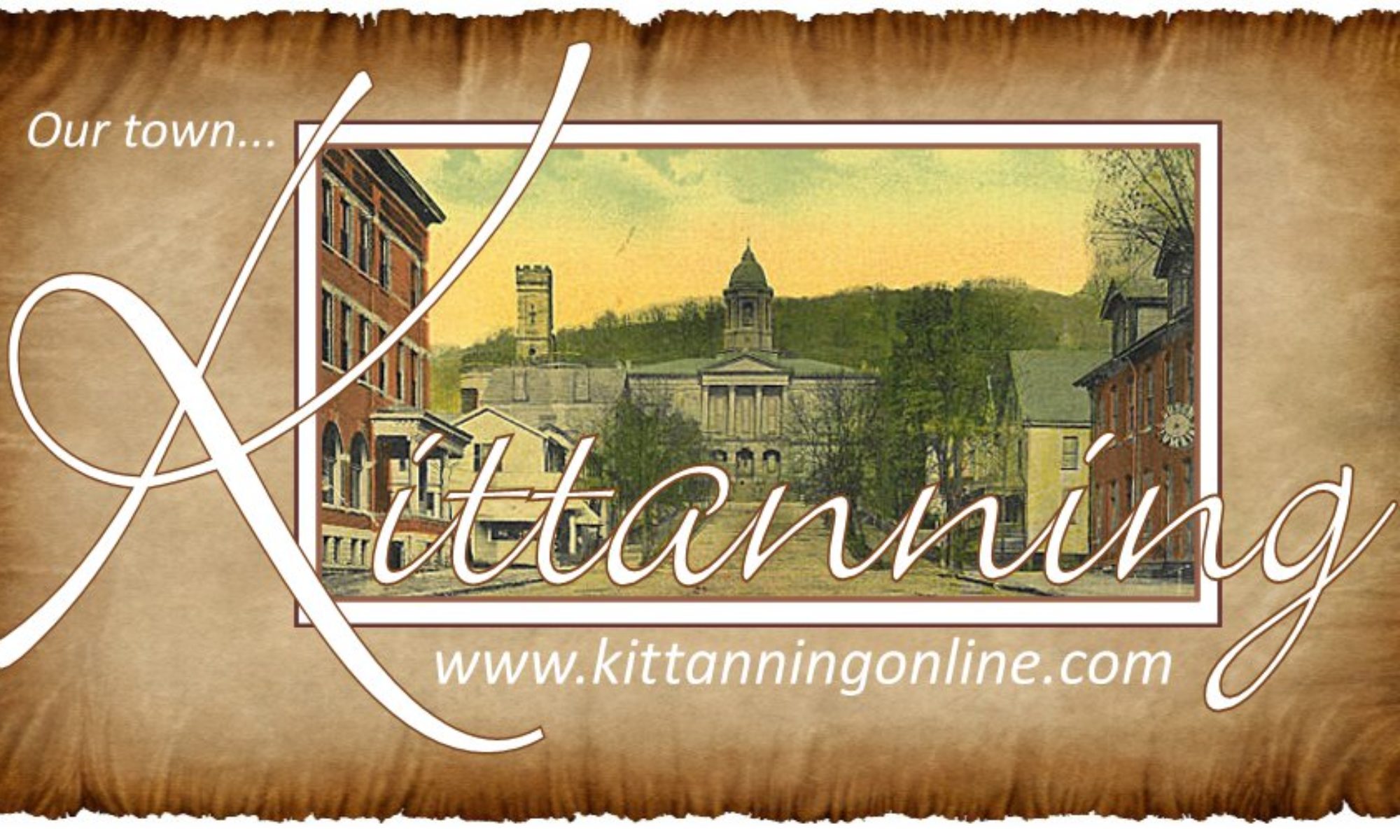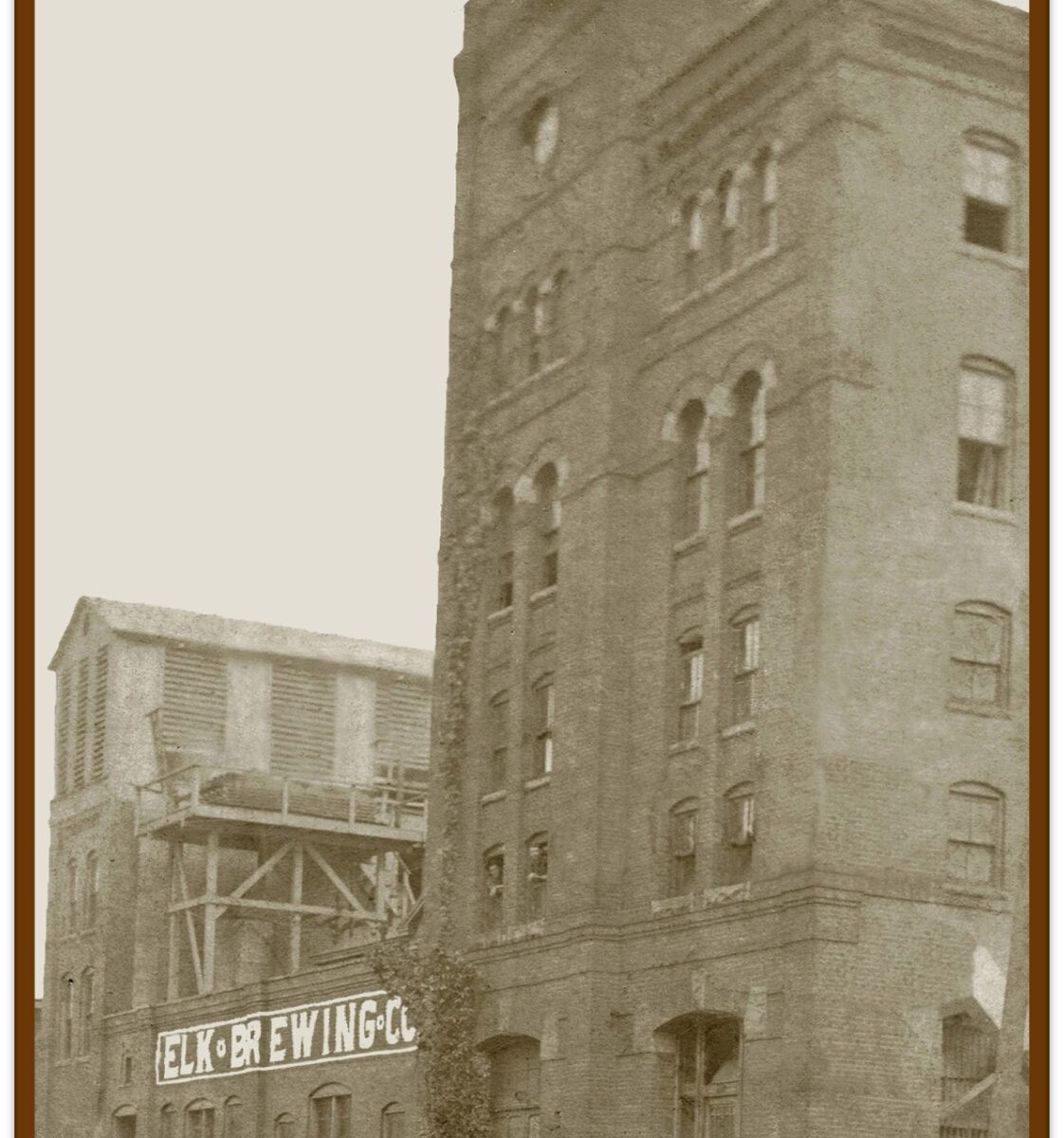By Jan Wolf Dowd
Not only in our town, but even from far away, family history is still a memorable treasure. So pleased to have Jan contribute her time and many years of research to share with us. By chance Jan and I met on her visit from California at the Armstrong Genealogical Library. I was glad to be a hometown historian that could assist with her passion. Her Grandfather Charles R. Weylman worked there, and the President of the Company Harry A. Weylman was her Great Grand Uncle.
It was the early 1890s, and some Kittanning businessmen decided to build a brewery in their community. To get started, they pooled $60,000 of their money to make Elk Brewing Company a reality. Shares in the company were given to each investor. Joseph S. Smith was the principal organizer and president. By 1894, a plant where the beer would be brewed was being established in Kittanning. On 10 Jul 1894, bids for the building of the plant to be located at Oak Street were received. The contract was awarded to Henry Schaffer on 18 Jul 1894 for $ 10,360.00. The building was expected to be completed by November. “The contract called for the completion of the buildings ready for machinery.” 1
In November 1894, it was reported the buildings were progressing rapidly, and “believed that the entire plant would be in full running order” by 1 February 1895. “The outside brickwork on the new brewery main building was completed on the first of this week. One of the features of the new brewery now during erection will be an ice plant. The brewery will use twenty tons per day, and the plants will make thirty tons per day. This will leave a surplus of ten tons for Kittanning customers.” 2
On 11 Dec 1894, Joseph S. Smith, George, W. Reese, Alexander Reynolds, Harry A. Smith, and Valentine Neubert, prominent Kittanning residents submitted an application to the Governor of Pennsylvania to incorporate Elk Brewing Company. The character and object of which is the manufacture and brewing of malt liquors, and “for this purpose to have, possess, and enjoy all the rights benefits, and privileges of Act of Assembly and supplements thereto. M.F. Leason, Solicitor.” 3

In the same month when the application was filed, the charter was issued in Harrisburg incorporating “The Elk Brewing Company of Kittanning with a capital stock of sixty thousand dollars.” The directors were J.S. Smith, V. Neubert, G.W. Reese, H.A. Smith, Alex Reynolds, H.H. Weylman and H.G. Luker. According to the Kittanning Times, “This is the company that is erecting the magnificent buildings back of the depot.” 3
Entity Name: ELK BREWING COMPANY
With Address At: NONE, KITTANNING, PA Entity No.: 0000108658
File Date: 12/11/1894
Entity Type: Domestic Business Corporation
Entity Status: Active
Note: Elk Brewing Company is still considered ACTIVE on the Secretary of State’s
website as of 15 May 2025. Search | An Official Pennsylvania Government Website
(pa.gov). In January 1895, it was reported that Elk Brewing Company would begin production in a few days. “The water well sunk by the company has been thoroughly tested and found to be fully up to the highest expectations.” 4
As predicted, the Elk Brewing Company brewed its first beer on 15 Feb 1895. Fifty barrels were brewed. 5 According to One Hundred Years of Brewing, the output of lager during the first year was about five thousand barrels. 6
In 1900, Joseph S Smith died on April 10. 7 According to his obituary, he “organized the Elk Brewing Company and was the company’s president.” 7 In his last will and testament, Joseph left his family his Elk Brew shares. The majority were left to his brother Harry A.Smith, one of the original Elk Brewing Company directors. 8 Harry A Smith, died in 1905. Harry A. Smith had a child Vernon Smith who shortly after father’s death moved to Altoona, PA. He married but had no children.

Although not much is known about Elk Brewing Company in the early years after the death of Joseph S. Smith and his brother Harry, it appeared to grow and thrive. Elk Brewing Company applied for and obtained a brewer’s license each year during the early 1900s and sold beer to Armstrong County and nearby counties. However, there is evidence that they failed to obtain a license to sell in each of the counties where the beer was being sold.9 Two of the original brewery directors, G.W. Reese, and H.H. Weylman as well as Charles Neubert, son of Valentine Neubert, became Presidents during the first 2 decades of the 1900s. H.H. Weylman served the longest from 1906 through 1920 and then again when the brewery re-opened in 1933. The number of employees between 1904 and 1920 ranged from 20 in 1904 to a high of 39 in 1916. Many advertisements for Elk Brewery were published – not only in newspapers and the Kittanning City Directory publications but also in local bars.


In 1910, the Elk Brewing Company expanded when it built a $10,000 brick bottling house. George Daugherty was the contractor.10 The building as shown on the map was across the street from the brewing company and still stands, now known as The Progressive Workshop.

Elk Brewing Company and its main competitor Kittanning Brewery Company produced what has been described as strong lager beer yet left no hangovers for those who drank it. John Jacob Borger, born in Germany on 27 Feb 1877, was the brewmaster at Elk Brewing Company from 1901 to 1920.11 He saw that the brewery produced the finest beer. 12
Note: After moving from Kittanning to Norfolk, VA, John Borger worked as a brewmaster for at least 2 more breweries. He retired in 1948 from Jacob Ruppert Brewery in Virginia which opened in 1942 and closed in 1953. He and his wife Julia Spahlinger Borger celebrated their 50th wedding anniversary at the brewery in 1951.11
Elk Brewing Company brewed products including Red Top Beer and Red Top Ale.


It was reported in November 1916 that “Elk Brewing Co., Kittanning, Pa., has doubled the capacity of their ice plant, put in a grains dryer and built a new bottling house. They also drilled two wells and now have their own water supply. “13 If Elk Brewing Company was doing so well, why did it close? At the beginning of the 20th century, temperance Societies were very vocal. Eventually, because of the growing support to ban alcohol, Congress passed the 18th Amendment to the US Constitution in December 1917 which was then ratified by the required three-quarters of the states in January 1919. To enforce the 18th Amendment, Congress passed the National Prohibition Act commonly known as the Volstead Act. Prohibition went into effect on 17 January 1920, one year after the Volstead Act passed.14 When alcohol became illegal to produce except near beer (<0.5% alcohol), some former breweries started making soft drinks, syrups for soft drinks, ice cream, and candy. However, there is no evidence that Elk Brewing Company tried to produce non-alcoholic products.
Elk Brewing Company closed, and their former employees found other jobs.
Next: Elk Brewing Company 1920-1937.
Also see the page of Weylman/Weilmann/Wellman who were associated with the Elk Brewing Co.
The Weilman/Weilmann/Weylman Family of Kittanning
References
- Kittanning Times, July 1894
- Kittanning Times, November 1894
- Kittanning Times, December 1894
- Kittanning Times, January 1895
- Kittanning Times, February 1895.
- One Hundred Years of Brewing, A Complete History of the Progress made in the Arts, Science and Industry of Brewing in the World, particularly during the Nineteenth Century, 1904, page 462
- The Pittsburgh Post, Pittsburgh, PA 11 Apr 1900.
- Joseph S Smith’s Will, 10 Jan 1898, Kittanning, PA will in The Pennsylvania, US, Will and Probate Records, 1683-1993
- The Pittsburgh Press, Pittsburgh, PA 20 Jun 1906
- IndustrialWorld, Pittsburgh, PA 15 Aug 1910
- The Virginian Pilot, Norfolk Virginia, 13 May 1951, page 43
- Kittanning Leader Times, Kittanning, PA, 19 Sep 1979, page 11
- The Brewers’ Journal, 1 Nov 1916
- www.britannica.com/topic/Eighteenth-Amendment
Jan Wolf Dowd
May 15, 2025

